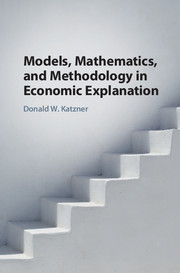Book contents
- Frontmatter
- Dedication
- Contents
- Preface
- Introduction
- 1 Science and Economics
- 2 Economic Models and Explanation
- 3 The Stages of Model Building in Economics
- 4 Models and Mathematics
- 5 Models and Measurement (or Lack Thereof)
- 6 Issues Relating to the Construction of Models from Scratch
- 7 An Example: The Efficiency of Organizational Forms
- 8 The Implicit Assumption Requirements of Later-Stage Model Building
- 9 Ordinality and the Adequacy of Analytic Specification
- 10 Categories of Models
- 11 Conclusion
- Index
10 - Categories of Models
Published online by Cambridge University Press: 26 October 2017
- Frontmatter
- Dedication
- Contents
- Preface
- Introduction
- 1 Science and Economics
- 2 Economic Models and Explanation
- 3 The Stages of Model Building in Economics
- 4 Models and Mathematics
- 5 Models and Measurement (or Lack Thereof)
- 6 Issues Relating to the Construction of Models from Scratch
- 7 An Example: The Efficiency of Organizational Forms
- 8 The Implicit Assumption Requirements of Later-Stage Model Building
- 9 Ordinality and the Adequacy of Analytic Specification
- 10 Categories of Models
- 11 Conclusion
- Index
Summary
Apart fromthose that represent structure or outcomes alone and the singleand multi-output model types all described in Chapter 2, explanatory economic models come in many colors and shapes. Models of the consumer, general equilibrium, bargaining, economic growth, and the macro economy, to name but a few, are commonplace and well known. These models may be seen as falling into different categories according to the nature of the analytical methods or techniques required to develop structure from their assumption base. As such, the class in which a particular model falls has a significant impact on the analytical content of the stages of its construction and the overall process by which that model is built. In the examples discussed so far, the building process ofmodels of the consumer generally involves the mathematics of constrained maximization; that of general equilibrium and the macro economy models often requires the mathematics of simultaneity; for models of bargaining the mathematics of game theory is frequently invoked; and for those of economic growth the use of the mathematics of differential or difference equations is usually a necessity. Because the category in which an explanatory model falls has such an important impact on the building of that model, it is worth considering a taxonomy of model categories in this chapter. There are numerous ways of classifying such models with respect to their assumption content and the general characteristics that that content implies. The classification scheme employed here contains three broad categories defined on the basis of abstract, general criteria that have far-reaching implications for the nature of the models they encompass. Each category is set against one that is diametrically opposed to it.
The categories in the order they will be discussed are as follows: (i) models that adhere to the tenets of methodological individualism (or just individualism) versus models that fall under the umbrella of structuralism, (ii) static models versus dynamic models, and (iii) models that assume certainty with respect to relevant data versus those that recognize and suggest ways of taking uncertainty in relation to those data into account. Also to be reviewed are several sub-categories of models, two with contrasting “opposites,” contained within the above model classes. In particular, dynamic models may be divided into models based on logical time versus opposing models in which time is viewed as historical.
- Type
- Chapter
- Information
- Models, Mathematics, and Methodology in Economic Explanation , pp. 212 - 233Publisher: Cambridge University PressPrint publication year: 2017



